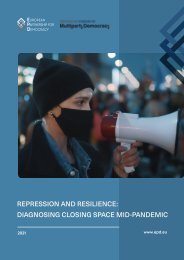Thinking Democratically: A Comprehensive Approach to Countering and Preventing Shrinking Space
You also want an ePaper? Increase the reach of your titles
YUMPU automatically turns print PDFs into web optimized ePapers that Google loves.
laundering has been translated in<strong>to</strong> national law in such a way that it greatly increases reporting<br />
requirements for NGOs, with the threat of their dissolution. 35 Since 2016, the UK government has<br />
introduced clauses in grant agreements that prevent implementing agencies from criticising the<br />
government. 36 Hungarian <strong>and</strong> Polish CSOs have lost their tax numbers <strong>and</strong> had their offices raided by<br />
state authorities. 37<br />
The usage of existing laws <strong>to</strong> close democratic space has in Zimbabwe led <strong>to</strong> the often-heard phrase:<br />
“in Zimbabwe there is rule by law instead of rule of law.” In addition <strong>to</strong> the overtly restrictive NGO<br />
<strong>and</strong> freedom of information act laws, Zimbabwean opposition <strong>and</strong> civil society figures are frequently<br />
harassed through judicial mechanisms, facing trumped up charges in court cases which are often<br />
prolonged, sometimes for years on end.<br />
Administrative measures are also used <strong>to</strong> limit freedom of the press. Through intermediaries such as<br />
media regula<strong>to</strong>rs, the government can censor <strong>and</strong> impose self-censorship by using advertising<br />
guidelines or withholding advertising revenue <strong>to</strong> limit certain kinds of content on news platforms, as<br />
was observed in El Salvador <strong>and</strong> Kenya. Burdensome bureaucratic procedures are put in place for<br />
travelling <strong>to</strong> certain areas <strong>to</strong> restrict news coverage of those areas, as in the case of Indonesia.<br />
Extra-legal measures<br />
“Civil society is currently fighting a battle for its legitimacy, <strong>and</strong> it’s not winning,” states a Kenyan<br />
civil society activist in an interview with CIVICUS in 2018. 38 “From every podium, including national<br />
television, the government is pushing a narrative discrediting civil society.” In line with this activists’<br />
experience, the Kenyan case study found that the ruling party has supported bloggers <strong>to</strong> spread<br />
hateful narratives about civil society, paving the way for repressive legislation.<br />
Smear campaigns are a powerful political <strong>to</strong>ol <strong>to</strong> shrink civic space, alongside other extra-legal<br />
measures such as violence, intimidation, trumped-up charges against activists <strong>and</strong> journalists,<br />
reductions in public funding <strong>and</strong> rhe<strong>to</strong>rical attacks <strong>to</strong> undermine the legitimacy of civil society.<br />
Physical aggression <strong>and</strong> intimidation through violence <strong>and</strong> criminal prosecution are old, but effective<br />
strategies that are still in use against civil society, journalists <strong>and</strong> activists <strong>to</strong>day, <strong>and</strong> are often<br />
combined. In Zimbabwe, the new regime quickly quelled hopes of widening space for contestation<br />
35<br />
Civic <strong>Space</strong> Watch (2018): Romania: anti-money laundering agency proposes legislation that increases NGO administrative<br />
burdens, under threat of dissolution. Available here.<br />
36<br />
Ibid 26.<br />
37<br />
EU Agency for Fundamental Rights (2018): Challenges facing civil society working on human rights in the EU. Available<br />
here.<br />
38<br />
CIVICUS (2018): Civil society needs a compelling counter-narrative. Available here.<br />
17

















